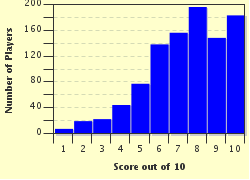Quiz Answer Key and Fun Facts
1. Vanuatu is part of the WWF ecozone of Australasia. In what ocean is it found?
2. Vanuatu has three official languages. What are they?
3. Vanuatu experiences frequent earthquakes, both from volcanic activity and from the interaction of two colliding tectonic plates. Vanuatu lies near the boundary between which two plates?
4. Vanuatu is located in the tropics (its capital, Port Vila, is located about 17.5 degrees south of the equator, 168 degrees east of the Prime Meridian). Like many tropical countries, it has a dry season and a rainy season, when most of the annual rainfall occurs and when cyclones pose a frequent danger to residents. When is Vanuatu's cyclone season?
5. Vanuatu's flag features a boar's tusk encircling two leaves of a local fern species (the namele). The fern represents peace. Why is the boar's tusk featured?
6. Which of the following invasive species arrived in Port Vila in the 1970s, and has spread through most of the other islands since then?
7. Vanuatu is one of approximately 40 countries where you can see dugongs (also called sea cows). The dugong is listed by the IUCN as a species vulnerable to extinction. Which of the following is NOT one of the prime reasons for this vulnerability?
8. About 90% of Ni-Vanuatu households regularly obtain food from an activity which creates local environmental pressures. Which of these is it?
9. Which of the following is NOT one of the human activities contributing to the extensive deforestation being seen on most islands of Vanuatu?
10. Which of the following is NOT a factor contributing to the lack of a reliable supply of drinking water which is experienced by much of the population of Vanuatu?
Source: Author
looney_tunes
This quiz was reviewed by FunTrivia editor
Exit10 before going online.
Any errors found in FunTrivia content are routinely corrected through our feedback system.


